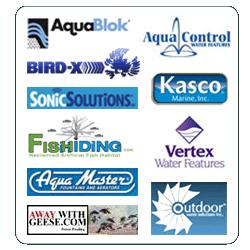Home > Lake and Pond Ecology > BMP's for Around Water
Green Up Your Lawns not Your Lakes
You may be fertilizing more than your grass!
The storm drain in your street is a link to our lakes and rivers. The choices you make when caring for your lawn directly affect water quality.
A common cause of lake and river pollution is phosphorus runoff. In response to this, many manufacturers now offer phosphorus-free lawn fertilizer.
Although phosphorus is important for grass growth, many lawns have adequate soil phosphorus and do not need further phosphorus fertilization If you suspect your lawn is in need of phosphorus, soil test first to make sure before using a phosphorus lawn fertilizer.
Phosphorus turns lakes and rivers green. Phosphorus stimulates the growth of algae in lakes and rivers. This crowds out other water plants and reduces oxygen available to fish. The result is unattractive, foul-smelling water that is bad for fish, wildlife, and humans.
Nitrogen, not phosphorus, greens up grass. Phosphorus-free lawn fertilizer still contains nitrogen, the plant nutrient that greens up grass.
To keep our lakes and rivers healthy, we need to manage phosphorus carefully. Read on to learn how you can reduce phosphorus runoff from lawn fertilizers and other sources!
Anything that enters a storm drain goes to a local lake or river. It does not go to a waste water treatment facility.
Do you know you live on waterfront property? You do if there is a storm drain nearby! Storm drains carry runoff water to local lakes and rivers. Whatever washes off your yard and street can pollute these waters. That includes lawn fertilizer, grass clippings, pet waste, and tree leaves and seeds - all sources of phosphorus, the plant nutrient that turns lakes and rivers green with algae.
Keep your runoff clean!
Keep our lakes and rivers clean!

REMOVE LEAVES FROM THE STREET
- Rake leaves, seeds and grass clippings out of the street and gutter.
- Compost on site, bag for collection, or take to community compost program.
PREVENT EROSION
- Phosphorus attaches to soil. Keep soil from washing into the street.

FERTILIZE THE LAWN, NOT THE LAKES AND RIVERS
- Choose a zero-phosphorus fertilizer. Many lawns have adequate soil phosphorus and will remain healthy without adding more.
- If you think your lawn needs phosphorus, test your soil first. For information contact your university extension office or soil conservation district.
- Sweep spilled fertilizer off paved surfaces.
- Remember, compost and manure contain phosphorus too.

CLEAN UP AFTER PETS
- Scoop the poop. Pet waste contains phosphorus as well as harmful bacteria.
- Don't feed urban geese.

KEEP THE PAVEMENT CLEAN
- Sweep up grass clippings, soil and fertilizer from driveways, sidewalks, and streets.
DISTRIBUTOR




